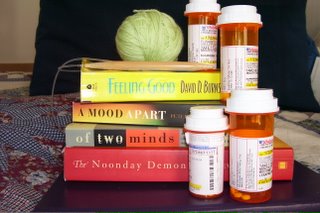
Depression
Honestly, this was the first word I thought of when trying to figure out what to write about D. I wasn’t sure if I was going to use it because there is still a lot of stigma associated with mental illness--despite the best efforts of advocacy associations--and I’m not really sure how I feel about having the information just out there on the net in front of God and everyone. Which is ultimately why I chose to write about depression. If people who have the disease are afraid to talk about it, that feeds the stigma.
I have suffered from depression since I was a child and didn’t have a name for it. I was totally against both talk therapy and medication until circumstances became so bad, it was either therapy and meds or a straight-jacket and a padded cell. After a long and painful, but illuminating journey, using a combination of therapy, drugs, exercise, nutrition, self education (through books), and knitting as therapy I am in remission. But, still taking my meds. Depression is a progressive disease. The time between episodes shortens while the episodes themselves lengthen and become more severe. Depression can also be fatal. A horrifyingly large number of depressives kill themselves. In cases where a patient has had several episodes of severe depression, medication becomes a preventative tool. There are people who might disagree with this strategy, but to them I say, would you normally tell someone with a progressive, potentially fatal, disease to stop taking their meds?
For me, depression was a fog that covered everything I did, everyone I interacted with, everything I saw. And it became more and more oppressive until something had to be done. Fortunately, the something I chose was to get counseling and start taking meds. Too often, that something is suicide. Because I was highly functional (or at least I appeared highly functional) when I was depressed, most people never knew. And now that I’m in remission, people doubt I was ever truly ill. To those people I say, try going up to a breast cancer survivor and telling her you don’t believe she had cancer because she’s still alive.
Unfortunately, there are too many people out there who do not truly understand what it means to have a mental illness. They think it means that the person who is suffering is lazy, making it up, being melodramatic, or seeking attention. Or, perhaps they don’t believe that mental illness is all that serious. However, it seems to me that, as bodily organs go, the brain is a pretty important one and if it’s malfunctioning, that’s a serious problem and one that requires treatment.
However, as bloggers tend to be a kind, sympathetic lot, I'm really preaching to the choir here. And I'm not posting to get sympathy. I am posting to share the D word that is most significant to my life and to stand up and say, I have a mental illness, and I am not ashamed!
I just want to leave you with one last thought. It’s one of my favorite quotes from one of the first books I read on depression which actually quoted it from another source.
"If there were a physical disease that manifested itself in some particularly ugly way, such as pustulating sores, or a sloughing off of the flesh accompanied by pain of an intense and chronic nature, readily visible to everyone, and if that disease affected fifteen million people in our country, and further, if there were virtually no help or succor for most of these persons, and they were forced to walk among us in their obvious agony, we would rise up as one social body in sympathy and anger. We would give of our resources, both human and economic, and we would plead and demand that this suffering be eased. There isn’t such a physical disease, but there is such a disease of the mind, and about fifteen million people around us are suffering from it. But we have not risen in anger and sympathy, although they are walking among us and crying in their pain and anquish." (The Far Side of Despair, Russell Hampton, 1975, quoted in Understanding Depression, Klein and Wender, 1993)
I would be remiss if I did not have a list of resources for you.
Some of my favorite books:
Understanding Depression, Klein and Wender, 1993. An excellent, short book describing depression as a biological disease. It’s not so keen on talk therapy, but I think that is a product of its time (recent studies have shown that talk therapy in combination with medication is the most effective treatment).
Feeling Good: The New Mood Therapy, Burns, 1980, 1999. Another good book that explains depression, but also describes both talk therapy (particularly cognitive-behavioral therapy) and medication. It has a wonderful section on medications, listing the characteristics and side effects of each, and every few years, that section is updated and a new edition is printed.
A Mood Apart, Whybrow, 1997. A slightly more intellectual look at mood disorders (including manic depression), but still very accessible to lay people. The author is a psychiatrist and usses clinical cases to illustrate points which makes it something of a memoir as well.
The Noonday Demon, Solomon, 2001. This book has it all. It describes itself as “An Atlas of Depression,” and rightly so. This book has the same biological and psychological descriptions of depression that the previous books do, but it also deals with the author’s personal experience (and therefore is part memoir) and addresses socio-economical issues (gender, sexual orientation, class), has a special section on suicide and even talks about mental illness and politics. A truly comprehensive work.
Websites:
http://www.nami.org/Hometemplate.cfm
http://www.dbsalliance.org/

You are not alone.
ReplyDeleteThank you for your bravery.